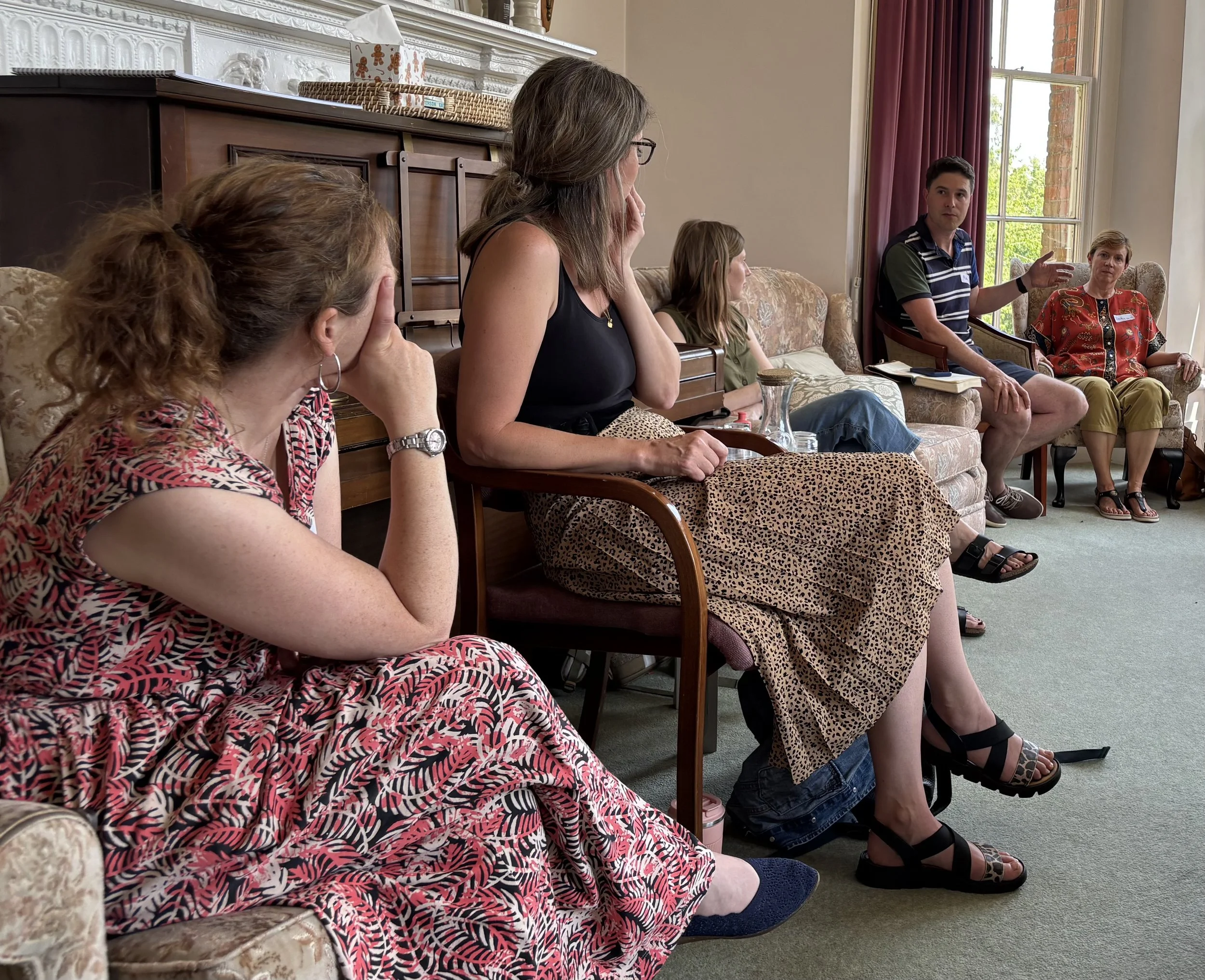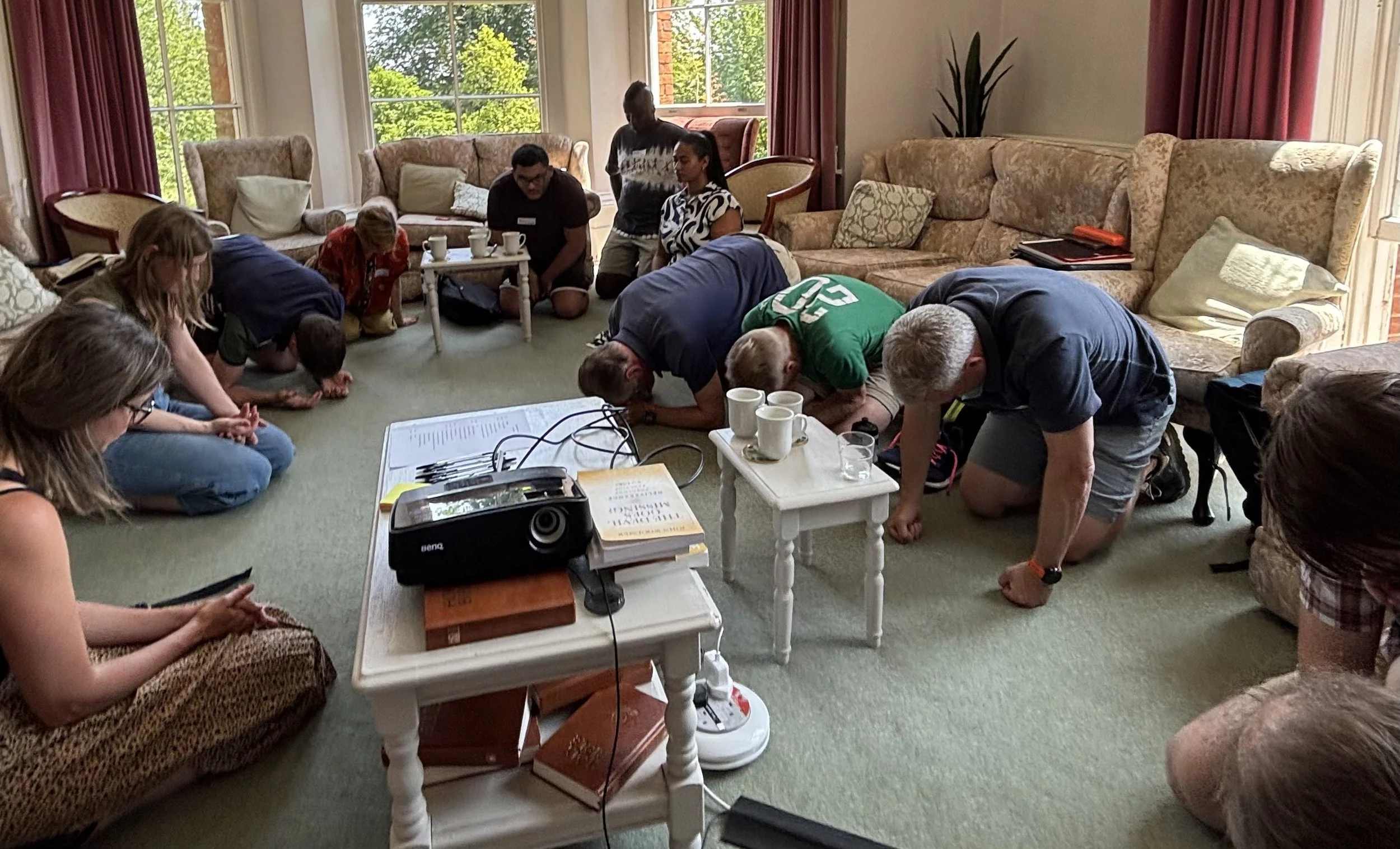Deliverance Ministry
Our National Leadership Team meeting with the SOMA Trustees, staff, team and guests was a wonderful occasion on 19 June. The day opened with an exploration of the theology of deliverance from Revd Dr Helen Collins, a recent SOMA team member in South Sudan and a member of the NLT.
Helen’s report on the mission in South Sudan had highlighted a number of things around spiritual warfare, discernment and deliverance, and this has sparked an intellectual journey she is sharing with students on her Charismatic Theology course at Trinity College, Bristol, as well as leading theologians in the academy and us as a community.
In preparing to visit South Sudan Helen had experienced a personal fresh call to follow the way of Christ - even if that meant a journey to the cross:
“Before travelling to South Sudan, many people were anxious for my safety, and I really wasn’t sure whether it was the right thing to go given my responsibilities at home – news reports of mass murders, riots, curfews, cholera, social media black outs, and plane crashes made us all nervous. On the train to the airport, I had a profound experience of needing to lay down my life and commit the lives of my family into God’s hands, knowing that God doesn’t promise to keep us safe and well, only to always be with us. It was the closest I have yet come to encountering my own mortality, as I cried on the train, not sure if I would return. While away, we didn’t encounter any danger directly (other than a large fire one morning in the building next to ours) but we were constantly aware of local threats through the stories people told us. Also, there was a dramatic political event which happened while we were there with the president sacking two vice presidents and the spy chief. This seemed to cause quite a lot of anxiety and fear among the South Sudanese, and there were stories of violence, explosions and unrest in different regions in response. One night, we considered rebooking our flights to return early and avoid any escalating conflict. However, we decided to stay, with a comical plan B to walk through the bush to Kenya if it got really bad, which caused much hilarity.”
This led to reflections many of us feel when we engage across borders around the world. How do we navigate the obvious gaps in safety, opportunity, and experiences, without burying our heads, ignoring what is going on around the world and pretending we are not a part of it?
“When we came to leave, I was so struck that many people had been praying for our safety, and we had the easy privilege of leaving to return to our places of safety. Our South Sudanese friends lack this privilege and have no one fervently praying for them. This inevitably raises many questions of guilt, responsibility and theodicy - why should God keep us safe but not them? What does it mean to advocate for God’s loving care with people perpetually in such an unstable and threatening context? How can mutuality of mission ever be possible when there is such a disparity between our opportunities and resources? How can we in the UK be so fixated on safe and unsafe spaces with no sense of what real, prolonged lack of safety looks and feels like? How is it that having seen and experienced the agonising realities for my South Sudanese brothers and sisters, I still wish to retreat into ignorance and looking the other way?”
But the way the mission panned out also sparked some deep reflection on deliverance ministry. In Helen’s report post-mission she began to reflect on her experiences:
“It was significant to think that the comparable experiences of tribalism, conflict, bitterness and power-plays we see in the UK might also have spiritual roots and causes. We thought about repeating patterns and strongholds in institutions we had been part of. This caused me to think that forms of deliverance ministry might be appropriate in certain UK contexts. We also thought about the culturally popular practices of, e.g. crystals, Ouija boards, manifesting, tarot, horror, witchcraft etc which are prevalent in the UK but often not taken seriously. I came away thinking that while the African context might potentially have an overly developed understanding of spiritual warfare, in the West we certainly have an underdeveloped understanding, and that more work needs to be done to address this, particularly with ordinands and particularly through intercession. I’m not sure I have previously spent so many hours intensely praying for a place not my own, and praying in ways which intentionally focus on the spiritual realities. It was transformative. Praying Compline in this context, and seeing it as essentially a service of deliverance, was powerful.”
Talking deliverance: Mike Tufnell reflecting on what might be lacking in Ziegler’s theology if he doesn’t allow for a personal devil.
Now several months later, Helen has brought her mission experience and her impressive theological brain and reading Into a continuing conversation. At the NLT Helen began to open up her interactions with Karl Barth on the nature of evil, Walter Wink’s Powers trilogy - which draws on Barth and takes on Paul’s theology on Power, as well as Peter Wagner, whose charismatic understanding of deliverance was a major influence on John Wimber and the many deviate movements from him and then to Amos Yong who integrated a Pentecostal perspective and Barth’s understanding of evil.
But Helen also had access to ideas not yet in print, and did a tour de force summary of work Reformed Theologian Philip G. Ziegler is doing to try and help a tradition with an underdeveloped theology of the devil engage. Ziegler sees the devil as ‘God’s adversary and ours’ and in his Princeton lectures argues that we in the 21st Century West need to take the devil more seriously and take more intellectual responsibility for our faith. Among his ideas was the conception of the devil as antichrist and so where Christ is the Way (of the cross) the devil is the distraction/temptation off that path; where Christ is the Truth, the devil is the father of lies and confusion; where Christ is the Life the devil is the thief of that life, seeking to possess life and take it away from us (‘steal, kill and destroy’). Hence Christ is the ultimate exorcist and the battle we experience with the devil is actually simply a part of the great battle Christ has had and is having with the devil. So when we resist the devil or fight against powers and principalities it is only in Christ that we can do so.
Responding to Helen’s call to follow The Way (of the cross).
Helen sees Ziegler as an ally for charismatic theology within the academy who is trying to raise a philosophical, academic perspective for an issue (deliverance ministry) which is only going to get more prominent and significant here in the West as we head into what Graham Tomlin calls a Neo-pagan era. From her position as Vice-Principal of Trinity College Bristol Helen is beginning to offer a charismatic reception/conversation to this.
It is hugely encouraging to see how going on a SOMA mission can spark ongoing excitement, theological discovering and learning months later. As we begin to roll out of SOMA Learning Cohorts, we are praying that many, many people in the UK will have similar faith stretching and brain developing journeys, beginning with the team heading to South Sudan next week - a team which will include an ordinand.
May the learning continue.
If you’d like to follow the conversation about deliverance ministry further hop over to yournameislikehoney.com where I am beginning a series of book reviews and reflections on deliverance ministry, including Graham Smith’s excellent study of Deliverance Ministry in the Anglican Churches: ‘The Church Militant’ which introduces Barth, Yong and a number of other theologians Helen was discussing as well as some more ‘how to’ popular level books, and a preview of a soon to be published handbook from Matthew Grayshon - one of our own very experienced SOMA team leaders.


